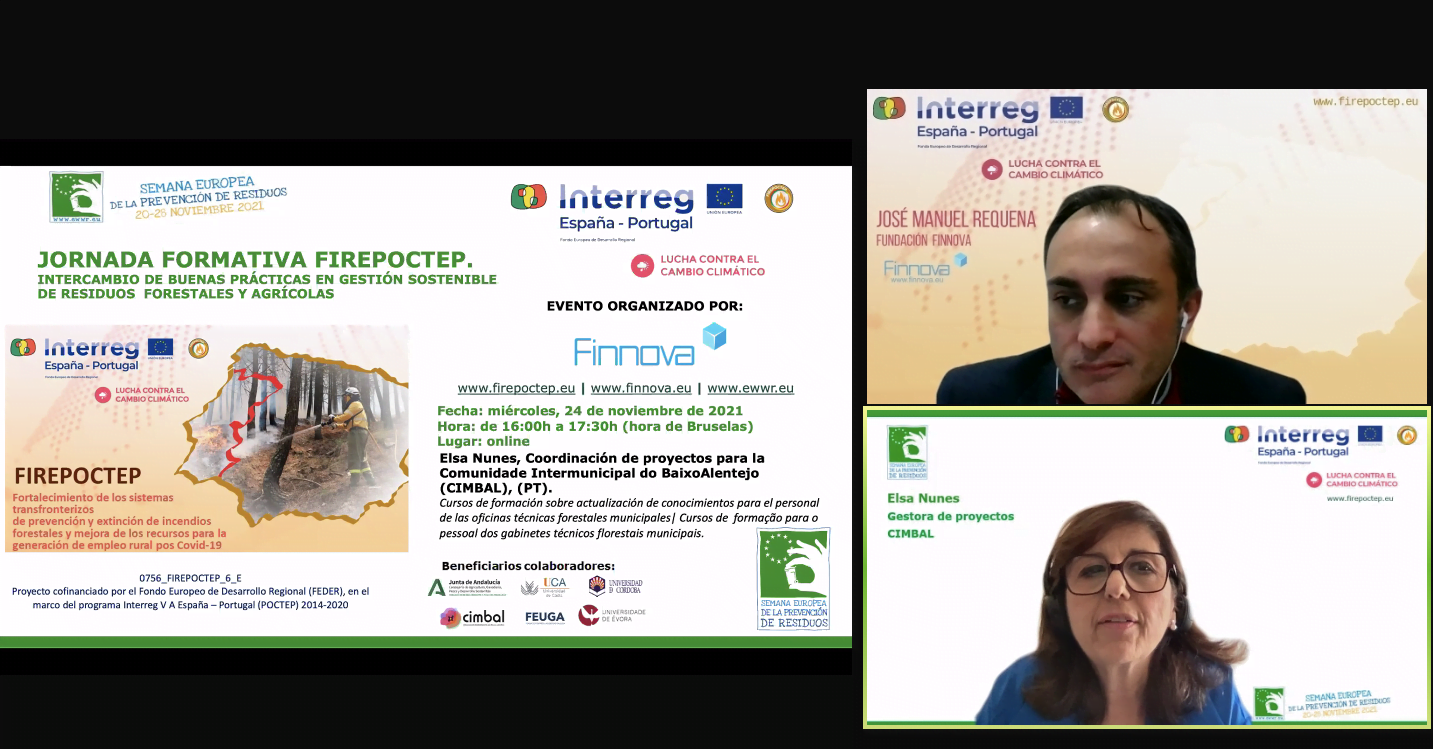The training action was divided into two blocks: training actions and European funds for innovative actions.
Brussels 30.11.2021
As part of the European Week for Waste Reduction (EWWR), which runs from the 20th to 28th November, the training day “FIREPOCTEP: Exchange of good practices in sustainable management of forestry and agricultural waste” was held on Wednesday 24 November 2021.
The conference, included among the training actions to be developed by the FIREPOCTEP Programme, was aimed at finding solutions to improve waste management in forestry and agriculture in order to reduce the risk of forest fires and their effects in the Raya area (border between Spain and Portugal).
Moderated by José Manuel Requena, Finnova’s Director of European Territorial Cooperation, it was divided into two main blocks, the first focused on the different actions carried out in the field of training and the second one focused on European funding for innovative solutions in the management of plant waste, and the prevention and extinction of forest fires.
Promotion of training actions
The first block was opened by Lucia Braña, Project Manager of the Fundación Empresa-Universidad Gallega (FEUGA), who stressed the need for the training to be aimed also at public corporate organisms: “The training is also for public corporate organisms that can take measures, theoreticians involved in fire extinction and for related associations that can promote the resolution of real problems”, she said.
Francisco Rodriguez y Silva, director of the Forest Fire Laboratory in the Forestry Engineering department of the University of Cordoba (LABIFUCO) recalled the different training workshops they were going to implement and mentioned the collaboration in the IV National Workshop on Lessons Learned from Forest Fires.
Elsa Nunes, project manager at the “Comunidade Intermunicipal do Baixo Alentejo” (CIMBAL) commented on the alignment of objectives between CIMBAL and the FIREPOCTEP project. “Since 2019, the CIMBAL Forestry office articulates the forestry instruments and produces and provides cartographic information to the municipal technical offices”, she highlighted.
Luis Carlos Barbero, Professor at the University of Cadiz, Department of Earth Sciences, spoke during his speech about the degree of drone use in the world today and how they can be used as tools. “Drones have a very important role to play in filling data gaps due to their possibilities and some of the main applications of drones are forest mapping, silviculture and forest residue volumetry, which allow for a considerable reduction in analysis times”, he explained.
Ana Luisa Abreu Alferes Lourido, a senior technician at the Institute of Earth Sciences (ICT) of the University of Évora, focused her presentation on the educational offer that the university has in the area of forest fires and highlighted the creation of several postgraduate courses and training within action 3.2 (a workshop and a classroom training course).
European funding for innovative solutions
Cristina Gouveia, from the Agência Nacional de Inovaçao, started the block on European funding by talking about the Horizon 2020 programme: “Of all the European instruments, Horizon is one of the most attractive. It is very competitive and open to all countries and partners”.
The FIREPOCTEP project technician of the Finnova Foundation, Hector Juan Armas, spoke about the different opportunities and grants that support blended finance with funds of up to 15 million.
Finally, Carmen Albendín, civil and criminal lawyer, department of Design and Advertising at the Escuela Autónoma de Dirección de Empresa (EADE), University of Málaga, presented the EADE campus, where the first master training in management of European funds will take place in collaboration with Finnova where the paid internships will be carried out.
About Interreg FIREPOCTEP (www.firepoctep.eu)
The FIREPOCTEP project is part of the fourth call of the Interreg V-A Spain-Portugal Cross-Border Cooperation Programme 2014-2020 (POCTEP), 75% co-financed by the ERDF (European Regional Development Fund) with a total budget of 5.6 million euros. With a duration of 3 years, its main objective is to analyse the impact of climate change on the risk of fires and their effects on the environment of the Raya (Spain and Portugal). FIREPOCTEP will not only improve cooperation and coordination of fire-fighting forces but will also serve as an example of good practices focused on the protection and promotion of the environment which, in turn, allows the creation of employment and innovation in rural areas through training actions, supporting the local economy, and the conservation of the landscape.

